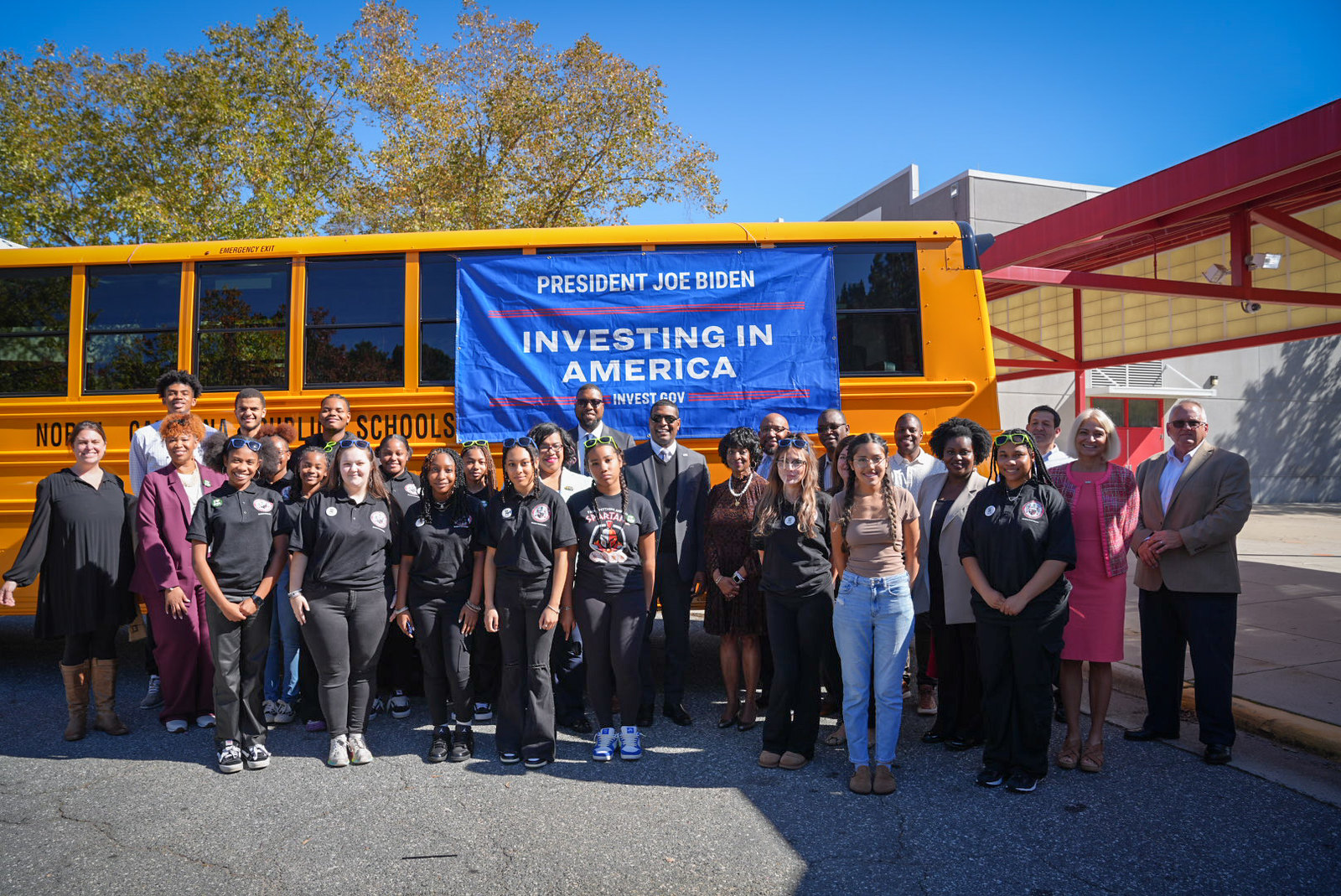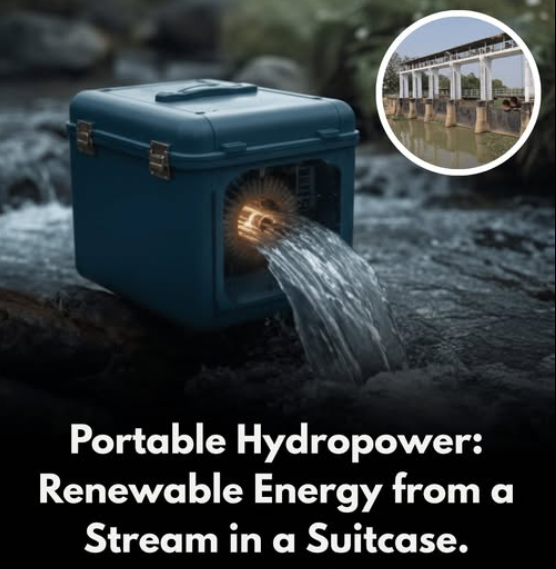
Photos courtesy of U.S. Environmental Protection Agency.
Last Thursday, Environmental Protection Agency (EPA) Administrator Michael Regan boarded an electric school bus in his home state of North Carolina. The bus would have been silent without the hum of a diesel-powered engine if not for the eager questions of Durham’s Southern School of Energy and Sustainability students.
Regan was in Durham for a ribbon-cutting ceremony with community leaders and elected officials including SACE’s Senior Electric Transportation Program Manager, Dory Larsen, to celebrate funding for 38 new electric school buses coming to Durham Public Schools. The $15 million grant comes from the EPA’s Clean School Bus Program, which uses funding from the Bipartisan Infrastructure Law (BIL) to replace existing school buses with zero-emission school buses.
Students wanted to know the EPA’s true motivations for investing in clean school buses. Was it an advantageous move in the clean energy market? A legal requirement? Or perhaps Regan, a Biden-Harris Administration member, was investing in cleaner air for the next generation.
“We are investing in you,” Regan said during a press conference after the electric school bus ride.

Photos courtesy of U.S. Environmental Protection Agency.
Regan, a North Carolina local, wasn’t the only government official with a personal connection to Thursday’s event. U.S. Representative Valerie Foushee (NC-04) once drove a school bus before climbing multiple levels of local government in Chapel Hill to U.S. Congress.
“As a former school bus driver myself, I am grateful for this significant federal investment that goes beyond upgrading buses and prioritizes the health of our children, our community, and generations to come,” Foushee said in a statement to SACE.
Energy and the environment have played key roles during Foushee’s time in government. Foushee voted in favor of the Bipartisan Infrastructure Law as a State Senator for North Carolina’s 23rd District in 2021 and is a supporter of the Inflation Reduction Act (IRA).
For Durham Mayor Leonardo Williams, a former teacher and school administrator, the Clean School Bus Program means being able to breathe easily.
“This new fleet of electric buses means even more to me, as I struggled with asthma as a kid and dealt with the smoke and fumes that can cause an attack,” Williams said. “Investments like these go a long way in ensuring that future generations have all the tools that they need to thrive in the classroom and beyond.”
Electric school buses emit zero tailpipe pollution, meaning students and drivers are at no risk of exposure to particulate matter and nitrous oxide from their school buses. These pollutants can contribute to respiratory disease, heart disease, cancer and other health problems. Lowered school bus emissions have even been shown to correlate with improved school performance.
“This federal investment in clean transportation will significantly reduce harmful emissions and air pollutants,” Congresswoman Foushee said.
Electrifying fleets also helps states lower their total contributions to carbon emissions, generating fewer greenhouse gas emissions and investing in a cleaner environment for students to grow up in.
Jackson Keith, a student at the Southern School of Energy and Sustainability, said he was grateful to be a part of the Clean School Bus Program.
“It was good to see people in power give back to the community,” Keith said. “Seeing people in the news taking care of the environment and taking strides to improve climate change with electric buses is great to see.”
Alexa Izquierdo, who introduced Administrator Regan as a student speaker at the event, said she has always been passionate about making changes to address climate change.
“I am glad that Durham is taking initiative to step forward to make a difference with climate change because a lot of people want to make changes but don’t take the steps to,” Izquierdo said.
Investing in the Clean Energy Generation
These students exemplify the Clean Energy Generation, a movement that bridges people of all ages and backgrounds with the common goal of addressing the climate crisis. With investments like the Clean School Bus Program, electric school buses and clean air could eventually be the new normal for generations to come.
“Last week’s announcement with EPA Administrator Michael Regan is a great reminder that the Biden-Harris Administration is making key investments into our youth and our environment,” Mayor Williams said.
There is currently a new round of funding available with the Clean School Bus Rebate Program, which school districts can apply for through January 9, 2025, at 4:00 p.m. ET. Watch this clip from our webinar with Maggie Dolan from EPA Region 4 on the EPA Clean School Bus Program for more information and resources to help you apply for your own electric school bus fleet.
JOIN THE CLEAN ENERGY GENERATION
The post EPA’s $15M Investment Brings 38 Electric School Buses to Durham, Protecting Kids’ Health appeared first on SACE | Southern Alliance for Clean Energy.
EPA’s $15M Investment Brings 38 Electric School Buses to Durham, Protecting Kids’ Health
Renewable Energy
Homeschooling
Decent and intelligent people respect the rights of parents to homeschool their children, but there are two reasons for concern: a) socialization, failure to expose children to their peers, so that they may make friends and come to understand the norms of society, and b) the quality of the education itself.
Almost all homeschooling in the United States is conducted on the basis of a radical rightwing viewpoint, normally a blend of evangelical Christianity and Trumpism.
Renewable Energy
The Positive Effects We’ve Had on Others Are Profound, Whether We Know It or Not
 There’s a theory that most people underestimate the positive effects they’ve had on other people.
There’s a theory that most people underestimate the positive effects they’ve had on other people.
Yes, that’s the theme of “It’s a Wonderful Life,” but it’s also the core of the 1995 film “Mr. Holland’s Opus,” in which a music teacher who deemed that his life had been a failure because he never completed writing a great symphony, is gently and beautifully corrected. Please see below.
The Positive Effects We’ve Had on Others Are Profound, Whether We Know It or Not
Renewable Energy
Renewable Energy Concepts Can’t Violate the Laws of Physics
 In the early days of 2GreenEnergy, my people and I were vigorously engaged in finding solid ideas in cleantech that needed funding in order to move forward.
In the early days of 2GreenEnergy, my people and I were vigorously engaged in finding solid ideas in cleantech that needed funding in order to move forward.
I vividly remember a conversation with a guy in Maryland who was trying to explain the (ostensible) breakthrough that he and his team had made in hydrokinetics. When I was having trouble visualizing what we was talking about, he asked me to “think of it as a river in a box.”
“Oh!” I exclaimed. “You mean you take a box full of standing water, add energy to it get it moving, then extract that energy, leaving you with more energy that you added to it.”
“Exactly.”
I politely explained that the laws of physics, specifically the first and second laws of thermodynamics, make this impossible.
He wasn’t through, however, and insisted that, in his office, his people had constructed a “working model.”
Here’s where my tone descended into something less than 100% polite. I told him that he may think he has a working model, but he’s wrong; if he believes this, he’s ignorant; if he doesn’t, but is conducting this conversation anyway, he’s a fraud.
“But don’t you want to come see it?” he implored.
“No. Not only would not fly across the country to see whatever it is you claim to have built, I wouldn’t walk across the street to a “working model” of something that is theoretically impossible.”
—
I tell this story because the claim made at the upper left is essentially identical. You’re pumping water up out of a stream, and then claiming to extract more energy when the water flows back into the stream.
Of course, social media today is rife with complete crap like this. We’ve devolved to a point where defrauding money out of idiots is rapidly replacing baseball as our national pastime.
-
Greenhouse Gases7 months ago
Guest post: Why China is still building new coal – and when it might stop
-
Climate Change7 months ago
Guest post: Why China is still building new coal – and when it might stop
-

 Greenhouse Gases2 years ago
Greenhouse Gases2 years ago嘉宾来稿:满足中国增长的用电需求 光伏加储能“比新建煤电更实惠”
-
Climate Change2 years ago
Bill Discounting Climate Change in Florida’s Energy Policy Awaits DeSantis’ Approval
-
Climate Change2 years ago
Spanish-language misinformation on renewable energy spreads online, report shows
-

 Climate Change2 years ago
Climate Change2 years ago嘉宾来稿:满足中国增长的用电需求 光伏加储能“比新建煤电更实惠”
-
Climate Change Videos2 years ago
The toxic gas flares fuelling Nigeria’s climate change – BBC News
-

 Carbon Footprint2 years ago
Carbon Footprint2 years agoUS SEC’s Climate Disclosure Rules Spur Renewed Interest in Carbon Credits



